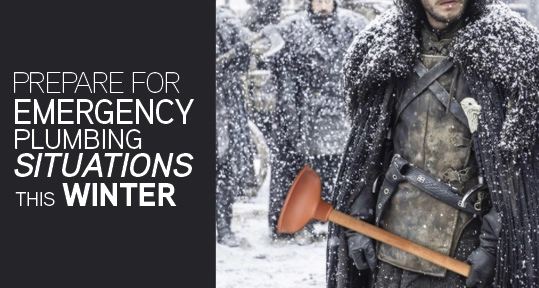Prepare for Emergency Plumbing Situations This Winter

While plumbing emergencies can strike any time of year, winter is a particularly likely season for something to go wrong. Cold temperatures and higher hot water demand, while guests are in town, can take their toll on your plumbing system. Consider three emergency plumbing situations your home is at risk of experiencing this winter and how to prevent them.
Frozen or Burst Pipes
What causes pipes to freeze or burst?
Any time the temperature drops below freezing outside, your plumbing is at risk of freezing. Frozen pipes are most likely if you have exposed plumbing outside or running along an exterior wall of an unconditioned room like the garage or crawlspace.
When the water freezes inside a pipe, it expands as ice forms. If too much pressure builds up inside the pipe, it can burst. If you don’t turn off the water and have the pipe fixed immediately, you could be left with a watery mess once the pipe thaws.
How to prevent frozen pipes
Fortunately, you can protect your pipes from winter weather. Follow these tips:
- Set your thermostat no lower than 55 degrees at all times, even if you’re away from home.
- On particularly cold nights, open a faucet and allow a slow trickle of cold water to run. Moving water is much less prone to freezing.
- Open under-sink cabinet doors to allow warm air to circulate around the pipes.
- Place space heaters in unconditioned rooms where plumbing is located. Warm the room just enough that the temperature stays above 40 degrees.
- Keep the garage door closed if pipes run through here.
- Keep exposed plumbing warm with electrical heat tape or pipe insulation.
- Drain your sprinkler system before winter hits.
No Hot Water
What causes the water heater to stop working?
Many things can go wrong with a water heater. The heating element could be getting old, or sediment buildup at the bottom of the tank could reduce the heating element’s effectiveness.
Before you assume the worst, always check the pilot light. Older gas water heaters ignite burners with a pilot light, so relight it if it goes out.
How to prevent water heater problems
One of the most important water heater maintenance steps you can take is to drain the tank and remove sediment buildup. A full flush is beneficial once in a while, but a mini-flush twice a year is effective as well. Here’s how to flush your water heater:
- Position a bucket under the drain valve near the bottom of the tank.
- Turn the handle counter-clockwise. If your water heater has a handleless stem, insert a flat-blade screwdriver to turn the valve.
- Close the valve once the bucket is full. Dump the water outside or down the kitchen sink.
- Repeat these steps until you’ve emptied a few gallons from the tank and the water runs clear.
- Be aware that groaning and gurgling are normal as air enters the tank to replace the water you’ve drained out.
Leaky Faucets
What causes a faucet to leak?
With the proliferation of germs in the winter, you probably wash your hands more often. Houseguests also increase the demand on your plumbing system, potentially causing handles to loosen, seals to wear out, or problems to develop with aerators.
How to prevent faucets from leaking
Keep an eye on your faucets and showerheads. If you spot a leak, don’t ignore the problem or your water bills could climb steadily higher. If you can’t repair the leak yourself, count on Mr. Rooter Plumbing for reliable emergency plumbing services.
We can resolve any of these plumbing problems and help prevent future occurrences.
 Click to call
Click to call


